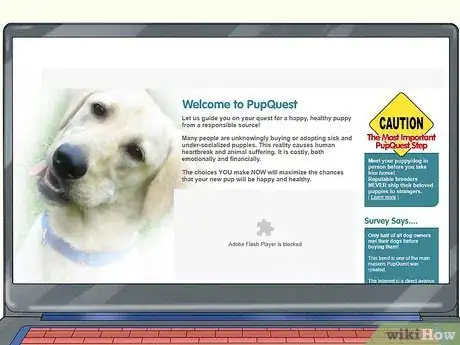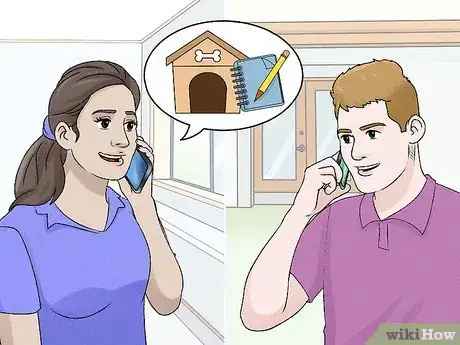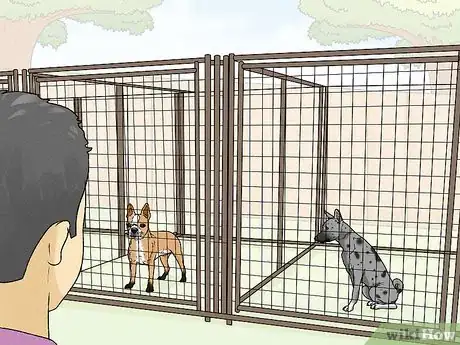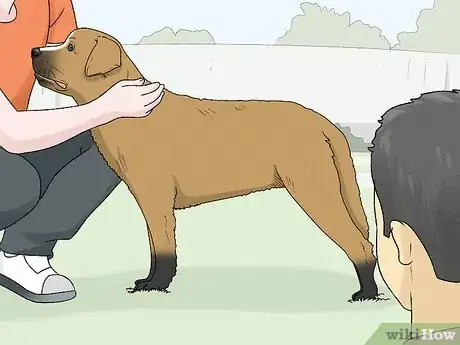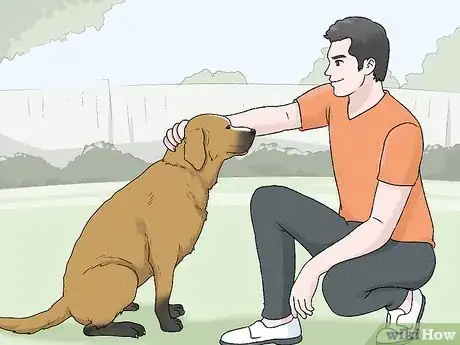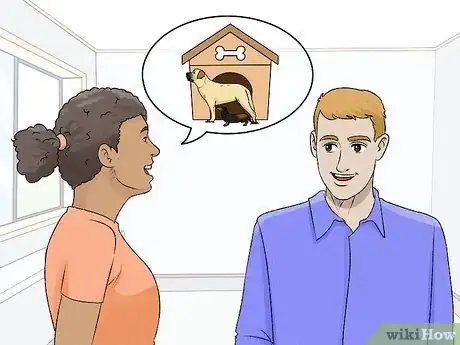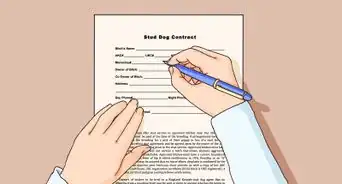This article was co-authored by Jeannie McElroy. Jeannie McElroy is a Canine Enthusiast & Breeder of Champion European Boxers under the kennel name Big Mac Boxers. With over 25 years of experience, she specializes in training, working, showing, and titling her dogs in many different types of ring sports. Jeannie is an AKC Evaluator and titles therapy dogs for Therapy Pets Unlimited. She is also a member of the AKC Bred with Heart, Greater Cincinnati Boxer Club, and US-BOX Working Boxer Association. She is passionate about the breed as she adores rearing the next generation through selectively breeding only health-tested dogs from pedigrees known to have quality genetics.
wikiHow marks an article as reader-approved once it receives enough positive feedback. In this case, 100% of readers who voted found the article helpful, earning it our reader-approved status.
This article has been viewed 50,915 times.
Perhaps you've been dreaming of owning a purebred puppy or have decided to finally add another member to your family and you are looking for a particular breed. Of course almost anyone can raise a litter of puppies and sell them, but a reputable dog breeder will have the right attitude, demeanor and documentation to ensure you are buying a healthy puppy from a trustworthy source.
Steps
Locating a Reputable Dog Breeder
-
1Get a referral. Ask your veterinarian if they know of a reputable breeder in your area or ask close friends who own healthy purebred dogs.[1]
- You can also contact local breed clubs or visit professional dog shows and strike up a conversation with participants or spectators to see if they know of a good breeder.
-
2Look online at the American Kennel Club. One of the most reputable sites to search for breeders, as well as determine which breed you might be interested in, is the American Kennel Club website.[2] While the American Kennel Club does not endorse, license or recommend breeders, they can provide information on many different breeds and help you locate a breeder in your area.Advertisement
-
3Search for breeders on pupquest. The website http://www.pupquest.org/ is run by licensed veterinarians and has a search for breeders option. They offer a lot of information about how to avoid puppy mills and find a reputable breeder.[3]
Confirming the Breeder is Reputable
-
1Ask to meet the breeder in person at their facility and be prepared with a list of questions. Finding an ethical, reputable breeder is very important to ensure the health of your new pup. If you contact the breeder, but they are coy about letting you see where the puppies were born and the conditions they are currently living in, this is a possible sign they are running a dirty breeding business or a puppy mill.[4] Create a list of questions to ask during your visit to the breeder, including:[5]
- How long have you been a dog breeder?
- How many types of dogs do you breed at one time?
- How often do you clean, feed, and play with the dogs?
- Are you a registered dog breeder?
- Can you show me proof of the dogs' physical health from a licensed veterinarian?
- Can I meet the pup's mother or parents?
- Can you provide references from other individuals or families who have purchased dogs from you before?
- Can you tell me about any potential genetic issues or problems with the types of dogs you breed?
- Can I return for multiple visits with my family before making a purchase?
-
2Check the conditions of the breeding facility. The breeder should be willing to show you the areas where the pups and the parents of the pups live.[6]
- The living areas for the dogs should be clean, spacious and well maintained.
- The dogs should be kept in roomy spaces that meet the needs of their particular breed. For example, most small breeds will be housed inside in the home, while sporting breeds will have plenty of outdoor space for exercise.
-
3Pay attention to the attitude and demeanor of the breeder's dogs. The dogs should be lively, clean, healthy, and not shy in front of visitors. But they should also not be aggressive towards you.[7]
- Note if the breeder is meeting the psychological and physical needs of their dogs by providing toys, exercise, and social interaction. If the breeder is stand offish or cold towards the dogs, this is likely a bad sign.
- The puppies should also be raised in the breeder's home, and the breeder should demonstrate care and attention to the puppies.
- A reputable breeder will likely not have a constant supply of puppies, as this would indicate a puppy mill and possibly bad treatment of the animals. They may keep a list of interested buyers for the next available litter and they should be willing to refer you to other responsible breeders or breed clubs if they do not have puppies available.[8]
-
4Check that the breeder only breeds one or two breeds. A good breeder should know their breed's history and health inside and out. It's difficult for one person to develop strong expertise about many breeds, so a good breeder will usually specialize in a single breed or maybe two.
- If the breeder advertises ten varieties of dog and all their mixes, they likely are not very reputable.[9]
-
5Wait to see if the breeder encourages you to interact with the puppy's parents. A good breeder will offer to introduce you to the pup's parents during your visit and be comfortable with letting you interact with the parents and the puppy.
- The breeder should also encourage several visits so you can take your time deciding on if the puppy is right for you, and should not mind if you ask to bring your family with you to meet the puppy.
-
6Ask the breeder about how they treat the mothers or bitches. Pregnancy, whelping and nursing puppies can be taxing on the mother dog's body, so a good breeder will limit the number of times they breed a bitch. Many breeders will only breed a female two or three times in the course of her life.
Confirming the Breeder's Credentials
-
1Ask the breeder if they are registered. Most reputable breeders will be registered with the American Kennel Club, so they should be willing to show you their credentials and confirm they are a registered breeder.[10]
-
2Confirm the breeder has documentation on the puppy's lineage and breed. The puppy's parents and grandparents must be professionally evaluated, including genetic tests, to check that any issues or problems with the breed have been addressed.[11]
- The breeder should also be comfortable with explaining to you in detail the potential genetic and developmental problems inherent to the breed.[12]
- They should offer you guidance on how to take care and train the puppy, and be available for assistance with any issues after you take your new puppy home, especially if you've never owned a dog before.
-
3Ask for records of vet visits for the puppy. Most reputable breeders will have a strong relationship with several local vets, so they should be able to show you individual records of the vet visits for the puppy.[13]
- These records ensure the puppy has been checked for diseases and health issues by a licensed veterinarian and has a clean bill of health.
- The breeder should also not require you to use a specific vet for the puppy's check ups.
-
4Check for references from other individuals who have purchased puppies from the breeder. A reputable breeder should have references they can give you from other families who have purchased one of their puppies.[14]
- You can also ask the breeder if they sell puppies to unknown buyers over the Internet. A reputable breeder will only sell their puppies to individuals they have met in person.
-
5Make sure the breeder gives you a written contract and a health guarantee. They should allow you plenty of time to read the contract thoroughly and not pressure you into a quick sell.[15]
- The contract may require you to spay or neuter the dog unless you plan to turn the pup into a show dog. As well, the contract may state you will return the dog to the breeder should you be unable to keep the dog. These are all normal stipulations of a breeder contract.[16]
-
6Be prepared to answer questions from the breeder. In fact, a reputable breeder should be concerned about who they are selling to, and want to feel comfortable about relinquishing one of their pups into your care. They may ask you why you want a dog, who will be responsible for the pup's daily care and training, where the dog will spent most of their time, and what “rules” you will have for the puppy.[17]
- They may also ask you for proof of residency, like your lease or mortgage papers, to ensure you can provide a stable home for the pup.
- The reputable breeder will likely give you a reference to a good veterinarian if you don't already have one.
Expert Q&A
-
QuestionIs it a good idea to ask to visit the pregnant dog before buying her puppies?
 Jeannie McElroyJeannie McElroy is a Canine Enthusiast & Breeder of Champion European Boxers under the kennel name Big Mac Boxers. With over 25 years of experience, she specializes in training, working, showing, and titling her dogs in many different types of ring sports. Jeannie is an AKC Evaluator and titles therapy dogs for Therapy Pets Unlimited. She is also a member of the AKC Bred with Heart, Greater Cincinnati Boxer Club, and US-BOX Working Boxer Association. She is passionate about the breed as she adores rearing the next generation through selectively breeding only health-tested dogs from pedigrees known to have quality genetics.
Jeannie McElroyJeannie McElroy is a Canine Enthusiast & Breeder of Champion European Boxers under the kennel name Big Mac Boxers. With over 25 years of experience, she specializes in training, working, showing, and titling her dogs in many different types of ring sports. Jeannie is an AKC Evaluator and titles therapy dogs for Therapy Pets Unlimited. She is also a member of the AKC Bred with Heart, Greater Cincinnati Boxer Club, and US-BOX Working Boxer Association. She is passionate about the breed as she adores rearing the next generation through selectively breeding only health-tested dogs from pedigrees known to have quality genetics.
Canine Enthusiast & Breeder of Champion European Boxers Well, it depends on where the female's at gestation. I personally do not allow visitors during the last two weeks of gestation due to risks of canine flu, parvo and other diseases that can travel on clothing and shoes.
Well, it depends on where the female's at gestation. I personally do not allow visitors during the last two weeks of gestation due to risks of canine flu, parvo and other diseases that can travel on clothing and shoes. -
QuestionHow can I find reviews on a dog breeder that I have picked?
 Community AnswerYou can look online, as many breeders have reviews posted online. If a breeder does not have any reviews or information available online, you should be careful about adopting from them as they may not be reputable.
Community AnswerYou can look online, as many breeders have reviews posted online. If a breeder does not have any reviews or information available online, you should be careful about adopting from them as they may not be reputable.
References
- ↑ http://www.humanesociety.org/issues/puppy_mills/tips/finding_responsible_dog_breeder.html
- ↑ https://www.akc.org/
- ↑ http://www.humanesociety.org/issues/puppy_mills/tips/finding_responsible_dog_breeder.html
- ↑ http://www.petmd.com/dog/care/evr_dg_breeders
- ↑ http://www.humanesociety.org/assets/pdfs/pets/puppy_mills/find_responsible_dog_breeder.pdf
- ↑ http://www.humanesociety.org/assets/pdfs/pets/puppy_mills/find_responsible_dog_breeder.pdf
- ↑ http://www.humanesociety.org/assets/pdfs/pets/puppy_mills/find_responsible_dog_breeder.pdf
- ↑ http://www.humanesociety.org/assets/pdfs/pets/puppy_mills/find_responsible_dog_breeder.pdf
- ↑ http://www.humanesociety.org/assets/pdfs/pets/puppy_mills/find_responsible_dog_breeder.pdf
- ↑ http://www.petmd.com/dog/care/evr_dg_breeders
- ↑ http://www.humanesociety.org/assets/pdfs/pets/puppy_mills/find_responsible_dog_breeder.pdf
- ↑ http://www.dogbreedinfo.com/findingbreeder.htm
- ↑ http://www.humanesociety.org/assets/pdfs/pets/puppy_mills/find_responsible_dog_breeder.pdf
- ↑ http://www.humanesociety.org/assets/pdfs/pets/puppy_mills/find_responsible_dog_breeder.pdf
- ↑ http://www.humanesociety.org/assets/pdfs/pets/puppy_mills/find_responsible_dog_breeder.pdf
- ↑ http://www.humanesociety.org/assets/pdfs/pets/puppy_mills/find_responsible_dog_breeder.pdf
- ↑ http://www.humanesociety.org/assets/pdfs/pets/puppy_mills/find_responsible_dog_breeder.pdf
- ↑ http://www.petmd.com/dog/breeds
- ↑ http://www.petmd.com/dog/care/evr_dg_breeders
About This Article
If you're looking for a reputable dog breeder and you don't know where to start, ask your vet or contact a local breed club for a referral. If your vet can’t help you, try getting a referral from friends who own pure bred dogs. Alternatively, search for breeders on websites like the American Kennel Club or Pupquest, which is run by licensed vets. Once you’ve found a breeder, ask to meet them at their breeding location, so you can see the conditions the dogs are bred in. You should also prepare questions to ask the breeder to confirm their credentials, such as how long they’ve been breeding, if they’re a registered breeder, and how many breeds they have. For tips from our Veterinary co-author, including how to tell if the parents are well looked after, read on!


